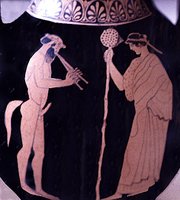Aulos
|
|
The ancient Greek aulos, often mistranslated as "flute", was a double-piped reed instrument. Archeological finds indicate that it could be either single-reeded, like a clarinet, but more usually double-reeded, like an oboe. Unlike the lyre, which could be mastered by any aristocrat with sufficient leisure to practice it, the aulos was an instrument chiefly associated with professional musicians, often slaves. Female aulos-players were a fixture of Greek drinking parties, and often doubled as prostitutes.
The aulos accompanied a wide range of Greek activities: it was present at sacrifices, dramas and even wrestling matches, for the broad jump, the discus throw, sailor's dances on triremes. Plato associates it with the ecstatic cults of Dionysus and the Korybantes. In his writings, Plato banned the aulos from his Republic but reintroduced it in "Laws".
In mythology, Marsyas the satyr or "papa selenus" was supposed to have invented the aulos, or else picked it up after Athena had thrown it away because it caused her cheeks to puff out and ruined her beauty. In any case, he challenged Apollo to a musical contest, where the winner would be able to "do whatever he wanted" to the loser - Marsyas's expectation, typical of a satyr was that this would be sexual in nature. But Apollo and his lyre beat Marsyas and his aulos. And since the pure lord of Delphi's mind worked in different ways than Marsyas's, he celebrated his victory by stringing his opponent up from a tree and flaying him alive. King Midas got donkey's ears for judging Marsyas as the better player. Marsyas' blood and the tears of the Muses formed the river Marsyas in Asia Minor.
This tale was a warning against committing the sin of "hubris", or overweening pride, in that Marsyas thought he might win against a god. Strange and brutal as it is, this myth reflects a great many cultural tensions that the Greeks expressed in the opposition they often drew between the lyre and aulos: freedom vs. servility and tyranny, leisured amateurs vs. professionals, moderation (sophrosyne) vs. excess, etc. Some of this is a result of 19th century AD "classical interpretation", ie. Apollo versus Dionysus, or "Reason" (represented by the kithara) opposed to "Madness" (represented by the Aulos). In the temple to Apollo at Delphi, there was also a shrine to Dionysus, and his Maenads are shown playing the Aulos, on drinking cups, but Dionysus is sometimes shown holding a kithara or lyre. So a modern interpretation can be a little more complicated than just simple duality.
It should be noted, however, that this opposition is mostly an Athenian one. We might surmise that things were different at Thebes, which was a center of aulos-playing. And we know that at Sparta – which had no Bacchic or Korybantic cults to serve as contrast – the aulos was actually associated with Apollo, and accompanied the kings into battle.de:Aulos fr:Aulos it:Aulos pl:Aulos sv:Aulos

